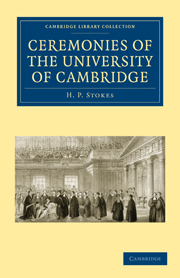Book contents
- Frontmatter
- Prefatory Note
- Contents
- ILLUSTRATIONS
- The Chancellor
- The Vice-Chancellor
- The Registrary
- The Proctors
- The Esquire Bedells
- Matriculation
- Congregations and Graces
- Degrees
- Commencement Day
- Insignia Doctoralia
- Honorary Degrees
- University Costume
- Processions
- The Presentation of an Address to H.M. The King
- The Bidding Prayer
- University Sermons
- The Orator
- The High Steward
- Representation in Parliament
- The Commissary
- University Discipline; the Sex Viri, etc.
- H.M. Judges and Trinity College
- The Admission of the newly elected Master of Trinity
- Commemoration of Benefactors
- The University and College Chests
- Obsolete Officers
- The University and Stourbridge Fair
- The University Arms
- The University Motto
- Index
- Plate section
- Frontmatter
- Prefatory Note
- Contents
- ILLUSTRATIONS
- The Chancellor
- The Vice-Chancellor
- The Registrary
- The Proctors
- The Esquire Bedells
- Matriculation
- Congregations and Graces
- Degrees
- Commencement Day
- Insignia Doctoralia
- Honorary Degrees
- University Costume
- Processions
- The Presentation of an Address to H.M. The King
- The Bidding Prayer
- University Sermons
- The Orator
- The High Steward
- Representation in Parliament
- The Commissary
- University Discipline; the Sex Viri, etc.
- H.M. Judges and Trinity College
- The Admission of the newly elected Master of Trinity
- Commemoration of Benefactors
- The University and College Chests
- Obsolete Officers
- The University and Stourbridge Fair
- The University Arms
- The University Motto
- Index
- Plate section
Summary
The Bidding Prayer is not actually a prayer itself; it was anciently called “the Fourme of biddyng the Common Prayers.” In the 1603 Canons, no. 55 is “the Form of a Prayer to be used (imitanda) by all Preachers before their Sermons (in concionum ingressu).” This Canon is founded upon the form in the Royal Injunctions of 1559, § liii, which was an expansion of the form in the Injunctions of 1547, § xxxvi, one still older being retained, with the omission of the Pope's name.
With regard to the specially added phrases used in the University–one of the few places where a Bidding Prayer is still recited–Dr Mullinger, in his University History (pp. 628-31), has an excellent Appendix (B) thereon. He even goes back to a sermon at Oxford on Ascension Day 1382 by a follower of Wyclif. He quotes the 1547 form referred to above, pointing out that the King is styled “Supreme Head.”
In a sermon, by Bishop Jewell, preached at St Mary's, Oxford, and printed in his Works as issued by the Parker Society, a Bidding Prayer–with University applications–is given early in Edward the Sixth's reign.
The Bidding Prayer used by Dr Perne on the visit of Queen Elizabeth to Cambridge, in August 1564, is printed in Nichols' Progresses, III, 54.
- Type
- Chapter
- Information
- Ceremonies of the University of Cambridge , pp. 54 - 55Publisher: Cambridge University PressPrint publication year: 2009First published in: 1927

